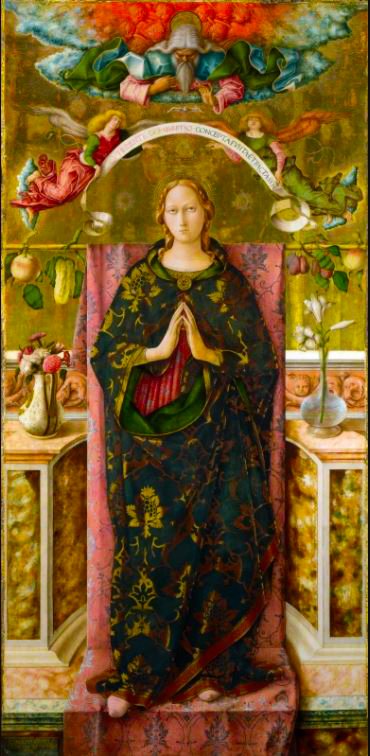Ethical Blindness and the “Women’s Health Protection Act”
Carlo Crivelli, The Immaculate Conception, 1492.
I should not be surprised or shocked, but I still shook my head in disbelief when the radical abortion “Women’s Health Protection Act” (H.R. 3755) failed to advance in the US Senate by only two votes this week. I do not by any means want to imply that selective ethical blindness is a uniquely liberal phenomenon. It is widespread, and I recognize a version of it in myself when I am tempted to rationalize a bad action of mine that I would never defend when I see others doing the same. Fallen human nature, a consequence of Original Sin, is in evidence all around us, and perhaps most distressingly, in our own hearts.
We have just entered the penitential season of Lent, a special time of inner preparation to work on our own blind spots and to help others with theirs. This is a real opportunity provided by the Church for conversion—turning towards God and what is good and away from false idols and sin. I find it interesting that the words idol and ideology are so similar. We have seen the vast devastation caused by ideologies, false intellectual visions of the world that distort ethical values, leading to the enslavement of entire societies and wide-scale acts of genocide. While committing terrible crimes, ideologues are frequently morally self-righteous about how they are serving the interests of humanity or their nation or ethnic group. It is perhaps the starkest example of ethical blindness.
The great philosopher Dietrich von Hildebrand had some key insights into what he called “value blindness.” He points out that a key challenge for us is that “only the man who grasps the sublime demand of values, their call, and the duty to turn toward them and to let themselves be formed by their law, is capable of personally realizing moral values.” We need to be able to see that a helpless and innocent preborn child calls forth our maternal and paternal instinct to protect these tiny humans. A terrible example of value blindness is the desperate defense of complete autonomy and the desire to be “unpregnant,” leading to the choice of surgical or chemical killing of the innocent.
Von Hildebrand identified the error represented by the “pro-choice” side clearly. “In a substitute morality, some extra moral value becomes the ‘formal representative of the moral sphere,’ and is made the determinant of all of morality.” In ethics we know that what really counts is what is being chosen, the objective nature of the act, and the circumstances surrounding it. The ability to choose is an important prerequisite for moral action but “choice” cannot itself be a moral value.
Some choices are objectively wrong. God endowed mankind with the great gift of free will, but this freedom was intended for us to choose Him and what is good. Ethics exists to promote discernment of how to do good and avoid evil, not to celebrate “choice” in the abstract or even sinful choices. When we make bad choices, it enslaves rather than liberates us.
That is where H.R. 3755 went off the ethical rails. Its entire purpose was to have the federal government ban any meaningful restrictions on choosing abortion. It was the abortion lobby’s response to limitations on abortion many individual states have enacted, and especially the Texas Heartbeat Law that bans abortions after it is possible to detect the heartbeat of the preborn child.
House Speaker Nancy Pelosi had this to say on the floor of the US House of Representatives in support of H.R. 3755. “In Roe, the Supreme Court held that personal liberty is protected by the Constitution, which the Court had recognized as extending to decisions relating to marriage, procreation, contraception, family relations, child rearing. And it’s broad enough to encompass a woman’s decision whether or not to terminate her pregnancy.” She pointedly identified herself as a Catholic mother of five children and said that she and her husband’s decisions should not be imposed on the women of America.
Pelosi is simply illogical in thinking that opposing abortion on demand means that women will be forced to have five children. She clearly has an ethical blind spot when it comes to abortion and has erected “choice” into a substitute morality. She is also quite self-righteous about it, calling the Supreme Court “cowardly” for allowing the Texas Heartbeat Bill to go into effect. I think the root of many ethical blind spots is spiritual. Yes, one can profitably point out the lack of logic in the “pro-choice” arguments, but what is really needed is conversion of heart. We have probably all experienced how hard it is not to “dig in” stubbornly when a person rebukes us for one or more of our faults with a “holier than thou” attitude. It is not just the right message but the proper means and messenger that count.
I am convinced that prayer for Nancy Pelosi is crucial. She is 81 years old and sees herself as a good Catholic grandmother. It is quite likely she never considered aborting any of her five children. Fighting for greater access to abortion is nevertheless a consuming passion of hers, despite what the Church solemnly teaches and the joy she experienced from motherhood.
I will be keeping her specially in my prayer intentions this Lent knowing that I am also wounded with blind spots. Perhaps the Lord in His mercy will remove Pelosi from her high office by means of the coming November elections and make it easier for her to convert on the issue of abortion. Sometimes professional setbacks can be spiritually profitable. I certainly hope Nancy Pelosi will have an awakening of her conscience and see that the only ethical choice when it comes to preborn children is to give life a chance.


